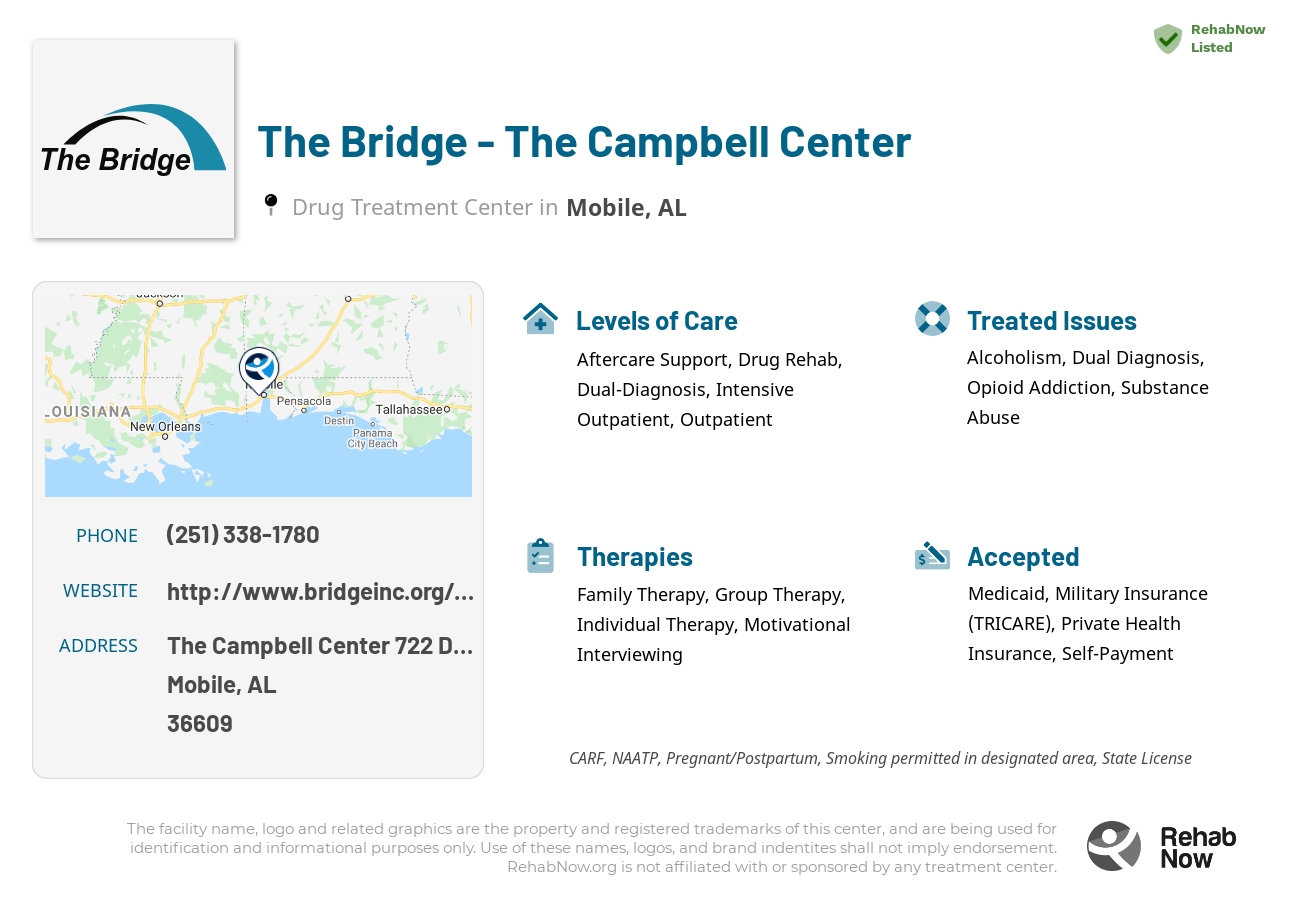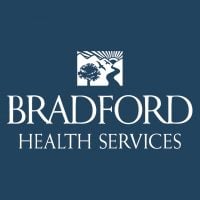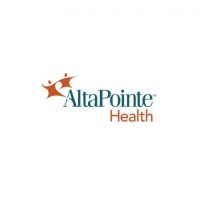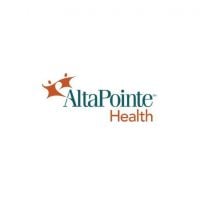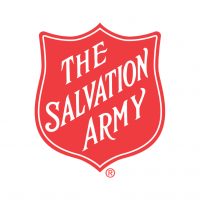The Bridge - The Campbell Center
Drug Rehab Center in Mobile, Alabama
The Bridge - The Campbell Center in Mobile, AL provides recovery services for individuals and families struggling with substance abuse, alcoholism, gambling, and codependency through a range of services, including an intensive outpatient program, individual or group therapy, and crisis interventions.
About The Bridge - The Campbell Center in Alabama
The Bridge - The Campbell Center, an addiction treatment facility located in Mobile, Alabama, was established in 1974. The center specializes in providing comprehensive services for individuals struggling with alcoholism, dual diagnosis, opioid addiction, substance abuse, and drug addiction. Affiliated with The Bridge, this facility offers a range of treatment options and levels of care to meet the diverse needs of their clients.
The Bridge - The Campbell Center offers a variety of services to address addiction and substance abuse concerns. Their treatment methods include aftercare support, drug rehab programs, dual-diagnosis treatment for individuals dealing with both addiction and mental health issues, as well as intensive outpatient and outpatient levels of care. Their team of professionals is committed to helping individuals on their path to recovery by tailoring treatment plans to suit each person's unique needs and challenges. From comprehensive assessment to therapeutic interventions and relapse prevention strategies, The Bridge - The Campbell Center aims to provide effective support for individuals seeking help with addiction and substance abuse problems in the Mobile area.
Genders
Ages
Modality
Additional
Conditions and Issues Treated
Substance Abuse Treatment is important when getting sober, as it helps addicts learn the skills they need to live a clean life. There are many different kinds of recovery treatment, including but not limited to medication-assisted therapy, behavioral therapeutic approaches, self-help groups, and counseling. Each treatment has its benefits that help addicts recover.
Counseling can help addicts learn the skills they need to live sober lives. It can be used to treat underlying mental health issues, like depression or anxiety, that could lead to relapse. Counseling can also help people find work, deal with family problems, and learn to manage living without drugs.
With so many people addicted to opioids, we need to help those who want to quit. The cycle begins when opioid addicts take opioids for a painful injury. When someone starts taking their medication differently or in excess, it means they’re addicted and at risk of overdosing.
In , detoxing from these types of treatments is the most effective way to beat this. Most facilities begin with medical assistance and then provide counseling services; rehabilitation follows after successful treatment.
Dual diagnosis refers to someone who has both an addiction and a mental or emotional illness. Dual diagnosis treatment includes therapy for both issues simultaneously, allowing for effective treatment of either.
Sometimes people with addiction disorders also have co-occurring disorders like depression, anxiety, bipolar disorder, etc. These require specialized treatment programs that address both drug and alcohol addiction as well as psychiatric illnesses. Some rehabilitation facilities provide patients with co-occurring disorders a program with highly integrated services and a clean, distraction-free environment.
Levels of Care Offered
This center offers a variety of custom treatment tailored to individual recovery. Currently available are Aftercare Support, Drug Rehab, Dual-Diagnosis, Intensive Outpatient, Outpatient, with additional therapies available as listed below.
An intensive outpatient program (IOP) is effective for drug rehab, but it can take six months to several years to complete. It’s the most popular type of drug rehab program in the United States. One example of a successful IOP success story is actor and comedian Chris Rock, sober since 1990.
An IOP allows participants to spend nights at home while attending meetings throughout the day. It’s a good way for drug addicts to make a recovery plan in an outpatient setting while still supporting their loved ones.
Alcohol or drug addiction, or co-occurring disorders, are treated in an outpatient program. The patient must attend therapy and other programs at the facility but can return home each night.
Outpatient treatment allows recovering addicts to live at home while receiving addiction treatment. Outpatients can attend group sessions for a few hours per week. Outpatients may also continue to work full time and study/attend school without interruption if they choose.
The accomplishment of completing a drug or alcohol treatment program is just the first step. Once that is complete, aftercare support comes into play. This includes helping people adjust to life without substances outside of guidelines with assistance like getting sober living accommodations and career counseling and AA/NA programs for those who are struggling between sobriety or want continued help in maintaining it once they have completed their initial rehabilitation at an addiction facility.
Aftercare comprises services that help recovering addicts readjust to normal day-to-day activities while working on specific issues. These problems include psychiatric issues, family problems caused by substance abuse, continuing education pursuits if desired during rehab, etc. These can last up to one year+ depending on what’s needed most urgently upon completion of earlier stages.
Therapies & Programs
Different people react differently to various treatment options. Some drug rehabilitation centers offer individualized treatment that caters to the specific needs of a drug addict. The best treatment option varies on an individual depending on the type of drug abused, life history, medical condition of the person, social circumstances, and the environment they live in now.
When a person enters drug rehab, they usually have anti-drug associations such as withdrawal symptoms, stress, cravings, etc. The first step of drug rehab is to detoxify the body from any residual substances in it. Drug rehabilitation centers usually employ trained medical professionals to help in this process. Usually, the initial detoxification lasts for five days, where the person is monitored under close supervision.
Family therapy sessions typically involve the addict and their family members. During these sessions, a therapist will work with everyone involved to help them understand addiction and find healthy ways of coping without substance abuse.
Some addicts might feel embarrassed about their substance abuse problems. By encouraging family members to attend these sessions, therapists can show addicts that they’re not alone in dealing with addiction. Therapists can also work with family members to help them understand addiction and learn how to offer support and encouragement to their loved one as they deal with substance abuse issues.
Attending group therapy at The Bridge - The Campbell Center in , is a useful way for those seeking sobriety to realize they aren’t the only one going through it.
This is when a group of people on different recovery phases get together and talk about what they’re going through, their triggers, successes, and failures. This can include alternative types of therapies too! Group therapy may occur on an outpatient or inpatient basis with groups that have no pre-existing relationships outside the session, unlike support groups where everyone already knows each other beforehand.
Cognitive Behavioral Therapy is a type of psychotherapy that helps people address the thoughts and behaviors that may have led to their addiction. It also helps change negative thoughts into positive ones and promotes healthy communication between addicts and those around them. CBT is an efficient treatment for individuals suffering from all sorts of addictions.
Cognitive Behavioral Therapy (CBT) focuses on the underlying thoughts and behaviors that caused the problem of addiction in the first place and may cause a relapse. Negative feelings are common in drug abuse disorders, but they can lead to co-occurring disorders if not recognized. CBT involves strategies that help to change the behavior pattern by restructuring negative thoughts into positive ones. It helps to remove these feelings, and it provides long-term benefits. Also, CBT promotes self-awareness, self-control and can be administered as a mono-therapy or as part of combination therapy.
Payment Options Accepted
For specific insurance or payment methods please contact us.
Is your insurance accepted?
Ask an expert, call (888) 674-0062
The Bridge Associated Centers
Discover treatment facilities under the same provider.
- The Bridge - Fort Payne Recovery Center in Fort Payne, AL
- The Bridge - Tuscaloosa in Tuscaloosa, AL
- The Bridge - Mobile Addictions Treatment Center in Mobile, AL
- The Bridge - Newman Road in Mobile, AL
- The Bridge - Gadsden in Gadsden, AL
Learn More About The Bridge Centers
Additional Details
Specifics, location, and helpful extra information.
Mobile, Alabama 36609 Phone Number(251) 338-1780 Meta DetailsUpdated November 25, 2023
Staff Verified
The Bridge - The Campbell Center Patient Reviews
There are no reviews yet. Be the first one to write one.
Mobile, Alabama Addiction Information
Opioids, such as heroin, fentanyl, and prescription opioids are related to more than half of all drug-related overdoses in Alabama. Alcohol is the most frequently used substance in Alabama; 85,000 Alabamians use cocaine every single year. In Alabama, there are four times as many vehicle crashes involving alcohol as there are normal vehicle crashes.
Mobile County, has the highest rate of drug overdose death in Alabama. 5.8% of Mobile teenagers reported using illicit drugs in recent years. 7.59% of adults reported using illegal drugs. Marijuana is the most frequent drug mentioned among persons seeking primary treatment. There are various types of treatment available in Mobile, AL. Many drug treatment programs in Mobile, AL, are gender-specific. The common treatment is an outpatient program.
Treatment in Nearby Cities
- Warrior, AL (230.8 mi.)
- Meridianville, AL (303.1 mi.)
- Northport, AL (179.8 mi.)
- Geneva, AL (137.7 mi.)
- Arab, AL (269.8 mi.)
Centers near The Bridge - The Campbell Center
The facility name, logo and brand are the property and registered trademarks of The Bridge - The Campbell Center, and are being used for identification and informational purposes only. Use of these names, logos and brands shall not imply endorsement. RehabNow.org is not affiliated with or sponsored by The Bridge - The Campbell Center.

